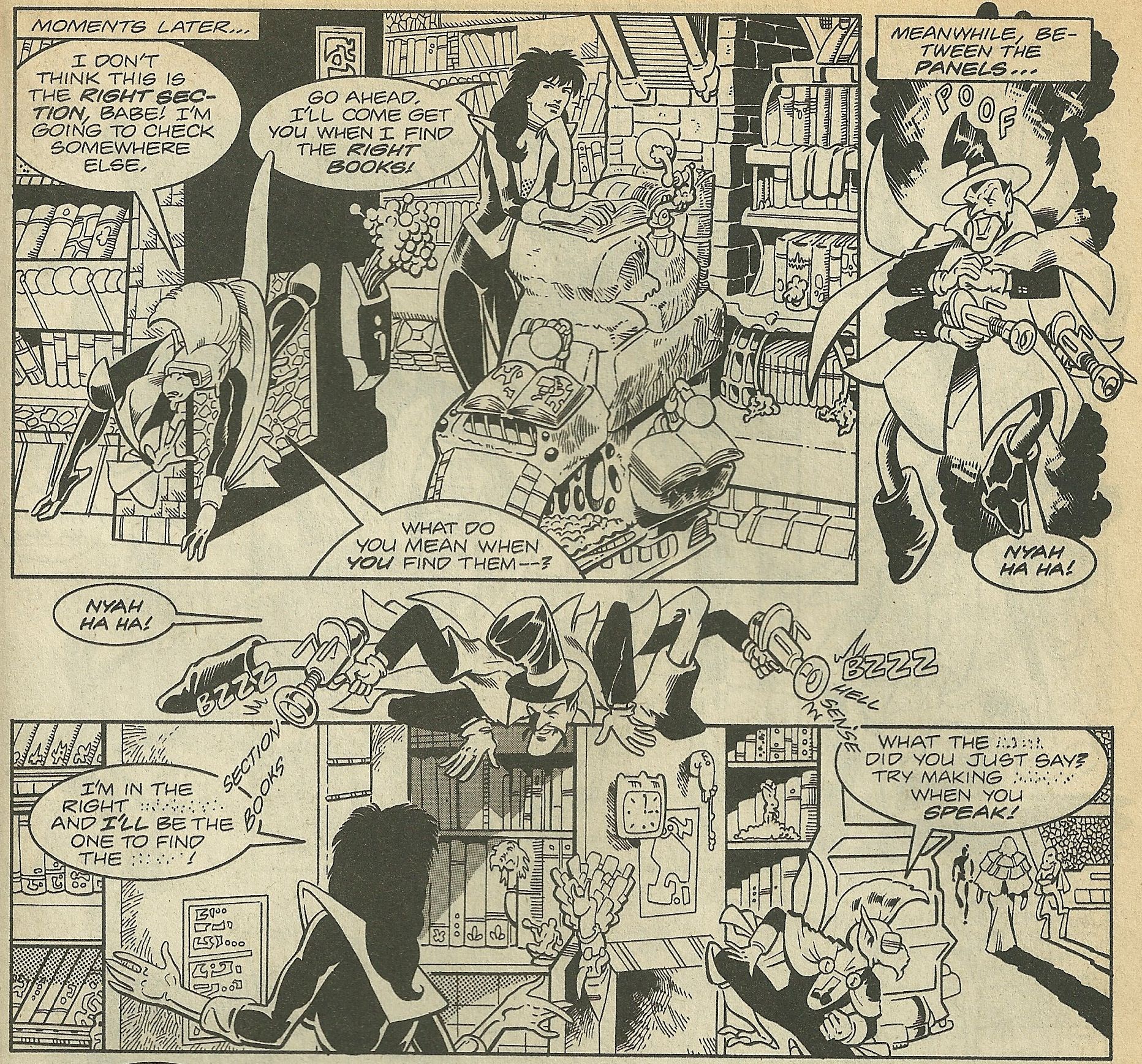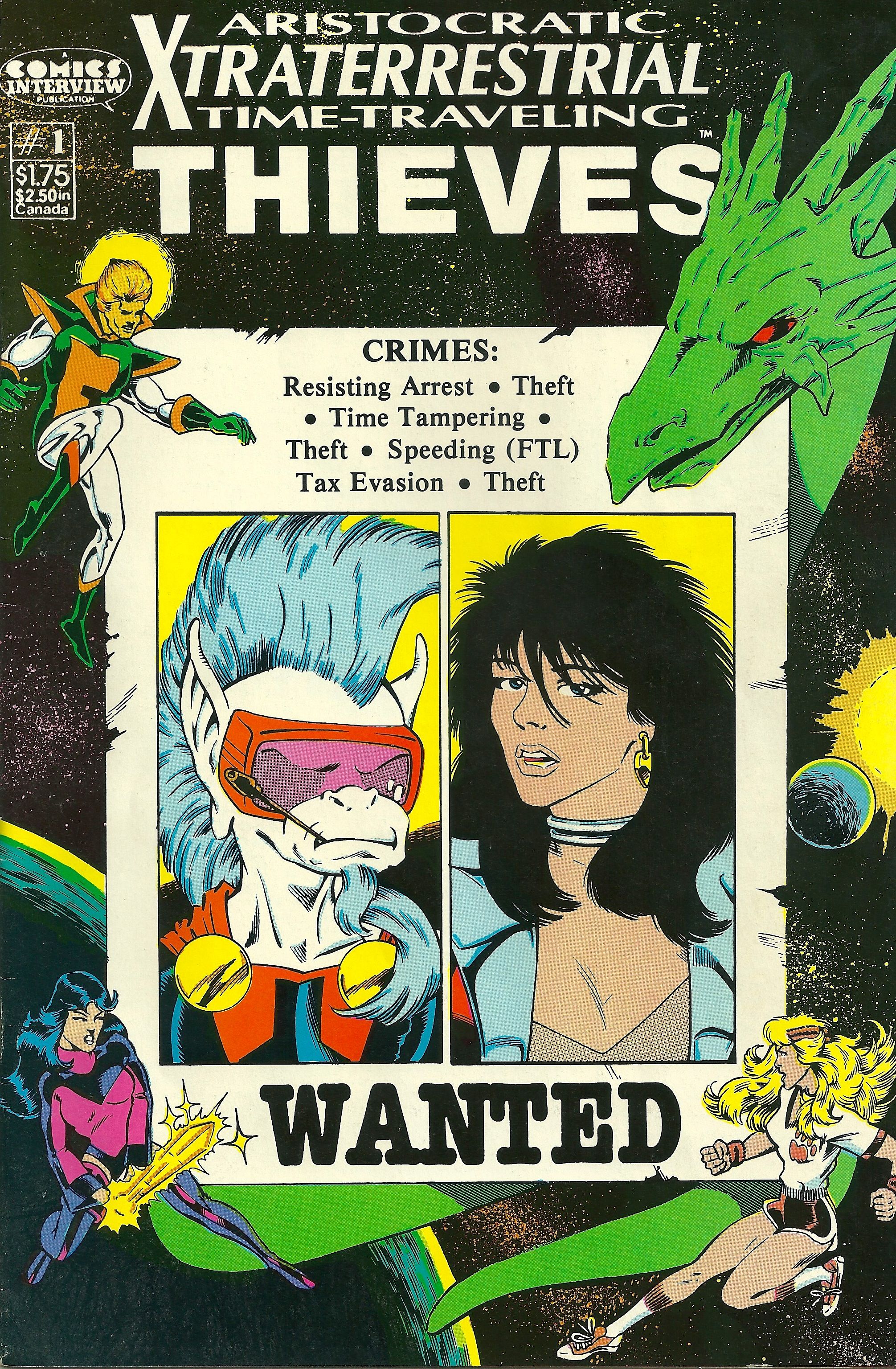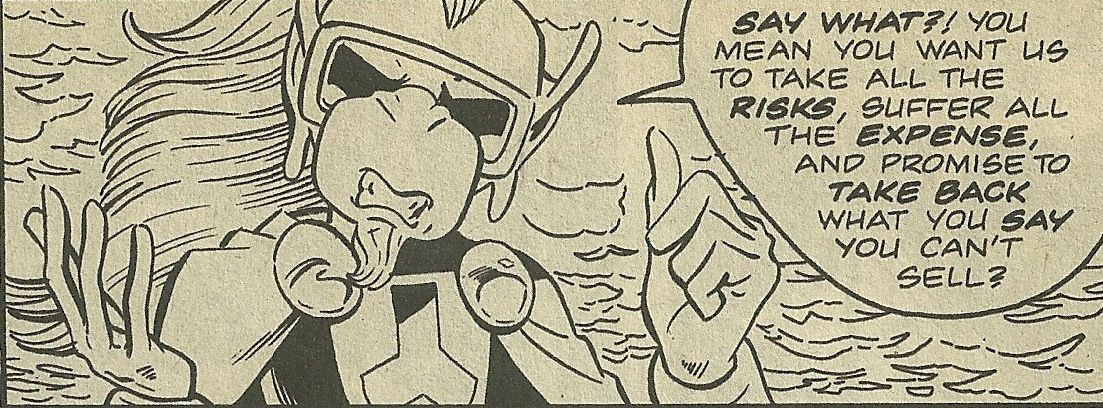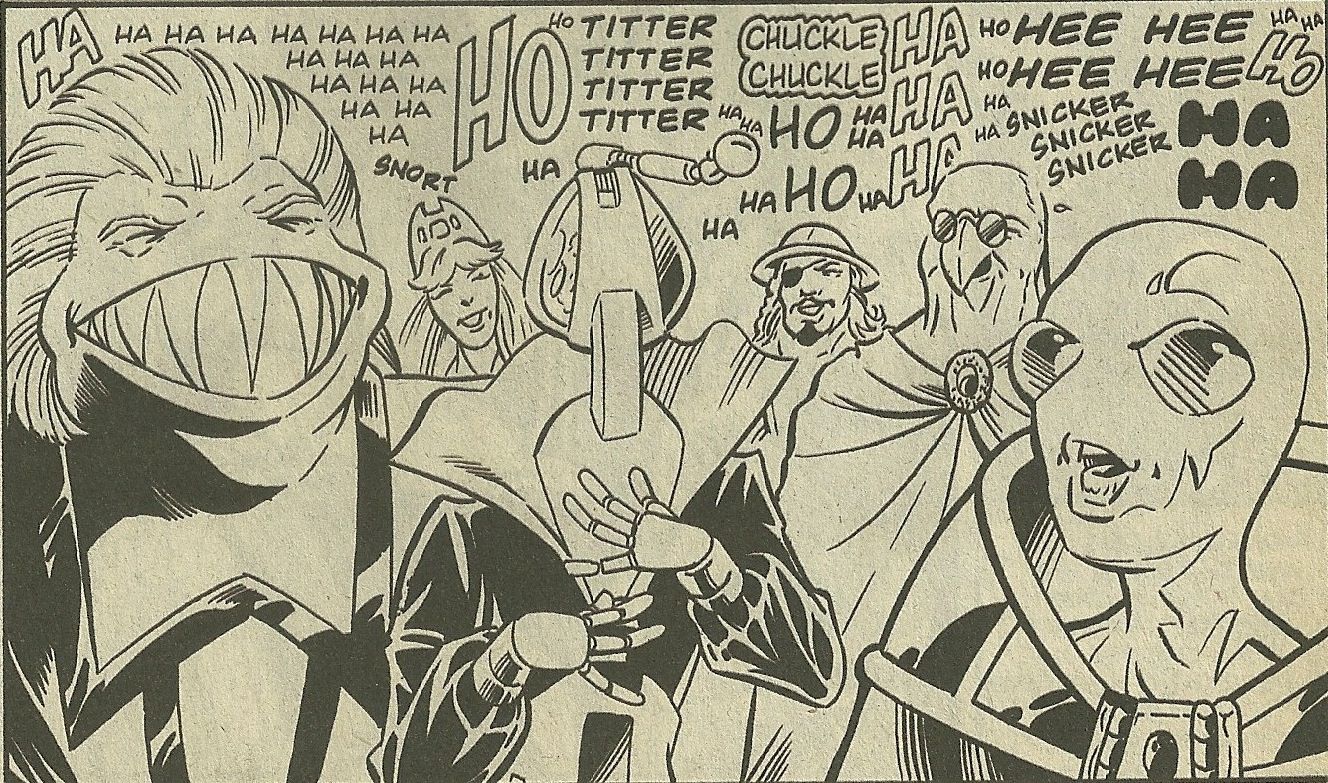A column in which Matt Derman (Comics Matter) reads & reviews comics from 1987, because that’s the year he was born. Click here for an archive of all the previous posts in the series.
Aristocratic Xtraterrestrial Time-Traveling Thieves #1-6 (Comics Interview) by Henry Vogel, Mark Propst, T.R. Davidson (#1-2), Jim Massara (#3-6), Dwight Jon Zimmerman, David Anthony Kraft
I've made seven or eight attempts at writing an opening sentence for this review, and none of them have quite clicked for me, so now I'm doing this. The trouble is that it's hard to know where to start with Aristocratic Xtraterrestrial Time-Traveling Thieves. Every issue is a full, self-contained story, and each of those stories has its own themes and narrative focus, so on the one hand the series is a little all over the place. On the other hand, it always maintains a very particular comedic tone, even if it uses that tone to tell a wide variety of tales. The main characters, Fred (full name Pansafredicopacog) and Bianca, have a natural, fun relationship with one another, and their shared spirit of adventure and self-interest is at the heart of every story. They're up for anything, and always aiming to come out on top, which allows writer Henry Vogel and artist Mark Propst to throw their protagonists into all kinds of crazy situations with equally entertaining results. The comic can sometimes be brazenly meta; Bianca and Fred are aware of their existence as comicbook characters, occasionally talking directly to Vogel and Propst and even, in one instance, escaping the book itself. At other times, it's a much more direct, simple, even familiar series about a pair of lovable criminals getting into and out of trouble with the law, pulling off heists, and other such low-stakes antics. No matter what is going on plot-wise, AXTTT is never just one thing, because its stars and creators are too energetically playful to let the book sit still or even settle into any single idea for very long. Yet it manages never to stray too far from the central concept of any given issue, consistently telling complete, clear stories even as it refuses to entirely define itself.
The skeleton of the comic is this: Bianca and Fred are the best thieves in existence, using time travel and other sci-fi technology, combined with their natural talents, to steal anything and everything they can. Sometimes they thieve for hire, other times for sport, and always for hefty profits. They're also, I'm pretty sure, a couple, although we never actually see them do anything explicitly romantic. She undresses in front of him once and neither of them treat it as new or even worth mentioning, and Fred makes a lot of jokes about his plans to sleep with Bianca, which she always dismisses in the name of professionalism, but also never seems to mind. Then in issue #5, an ex-lover of Bianca's named Hunk shows up and kidnaps her in a delusional attempt to win her back. While Bianca shuts Hunk down and Fred works on rescuing her, they both say at different points that they love each other, which I believe is the first and only time they make any such declaration, at least within these six issues. So based on that, they're pretty definitely involved despite the lack of further evidence, but ultimately their relationship status isn't all that important. What matters is that they're best friends
and equal partners, genuinely enjoying one another's company and always able to rely on each other in a tight spot. Which is important, since their entire life is basically one tight spot after another.
Because Bianca and Fred are so close, and because they can travel through both space and time, Vogel gets to stretch his imagination. Not every idea is gold, but the characters are fun to watch in any situation. They steal a robot without knowing what it does, then discover to their horror that it's programmed to act like an overbearing, over-protective, oppressively strict mother. One of their many enemies hires reality—as in the concept of reality personified—to come into the AXTTT universe so that all of Bianca and Fred's impossible skills, tricks, and gadgets will no longer work, so they then have to capture reality remove it from their world. In my favorite issue (#6), they get their speech censored and their thoughts policed by characters/creatures who live in the spaces between the panels, so Fred and Bianca end up bursting out of their own book to confront their censors directly. It's weird stuff, and like I said, not everything works. Issue #4 is a 24-page-long attack against the over-abundance of black-and-white comics being published at the time, and the mishandling of it by creators and retailers alike. It's a topic that Vogel is obviously pretty worked up over, as the writing is little more aggressive than usual, and that edge doesn't feel right on these characters or in this series. So there are some misfires, but even those are more inventive and amusing than your average comicbook issue.
Along the same lines, there are a lot of jokes that miss the mark, but Vogel spits them out in such quick succession that the bad ones don't last long before good ones step in to replace them. Between Fred's immaturity, Bianca's sarcasm, their foes' general ineptitude, and the frequent comic industry references and in-jokes, it's fairly rare that a single panel go by without some kind of gag, and I'd be surprised if any
full pages were wholly joke-free. Plus a lot of the story concepts are jokes to begin with. The debut* gives Bianca and Fred credit for getting rid of New Coke and bringing back the original formula, so things are silly right out the gate. I'm in favor of silliness when its taken seriously, and both Vogel and Propst, as well as their stars, seem to feel the same way.
Propst's artwork isn't jaw-dropping, but he does a lot of things quite well that are especially good for this series. For one, he can really cram in the extra panels. It's not at all uncommon for there to be eight or more panels to a page, and their sizes vary, the layouts shifting all the time. He is, thankfully, smart about letting the images have more room when there are big reveals or important action sequences, though full splashes don't happen much. There are a few instances where the comic gets overcrowded, but more often than not, there's enough gutter space and flow that it feels like there's ample room for everything Propst wants to include. Part of the reason this matters is that every new panel is a new chance for a visual gag, and AXTTT always wants as many of those as possible. But what the layouts are most helpful with is making sure every issue can be a standalone story, while still having space for all of Vogel's extra ideas, jokes, etc. Propst is a perfect partner for Vogel in that respect, because the stories tend to have a decent number of sidetracks, incidental characters, and other superfluous odds and ends that are added in the name of humor, and only truly succeed because Propst knows how to juggle them.
The most important skill of Propst's as far as this title is concerned is his character designs. It is there that he can and consistently does match Vogel's eagerness to try things and overstuff the comic with new material. Fred and Bianca see many corners of space, and therefore encounter all sorts of different species, but Propst is never at a
loss when it comes to populating this reality. Not that some of the aliens aren't similar, because of course they are, but Propst pulls from a diverse group of influences to fill in the cast, mixing genres and experimenting with shape, size, and style. The extras in this book aren't just distinct but also uniquely amusing and interesting, and the protagonists have a strong visual dynamic to go with their interpersonal one. Bianca appears to be human, though I don't know if she's ever overtly identified as such, and is tall and lean with a distinctly 80's sense of fashion. Fred is a pint-sized, stubby, dog-rat-man-looking alien in space-faring superhero garb. They're a delight to watch in action together, which is the biggest strength of the series as a whole. However bizarre the story it wants to tell, there's always going to be some level of enjoyment to be had simply because Bianca and Fred are such a good team, head-to-toe.
Right from the three-adjective title, AXTTT promises not to be pinned down. It's always looking for new directions, angles, and sources of comedy, trying to tell different kinds of stories without needing to change its voice or fundamental point of view. Most of the time it does a good job of that, and its slip-ups are never that huge. If you don't like a given story, you know it'll be wrapped up by the end of the issue, and then something completely different will follow. That approach may not be for everyone, and while I appreciated it here, I also love me some longform storytelling, so the series of one-offs formula is not inherently a positive. Similarly, Vogel and Propst's sense of humor meshes reasonably well with my own, or certain parts of my own, but without finding it funny I can't imagine getting through even one whole issue of this comic, considering it's relentless with the jokes. Point being, I wouldn't expect everyone to like Aristocratic Xtraterrestrial Time-Traveling Thieves as much as I did, or even at all. It has a narrow appeal that happened to do it for me, and I 100% recommend giving it a shot if you can, but my endorsement isn't ringing so much as pleasantly, but quietly, humming.
*Technically, the AXTTT #1 discussed here is the second #1 issue the title had. The first was published December 1986, and labeled as a "micro-series," which is just a jokey way of saying "one-shot." Considering the second #1 came out in February 1987, and the series was bi-monthly after that, it's not clear to me why the original issue was a micro-series and not just the beginning of the bi-monthly ongoing, but...there you have it.




